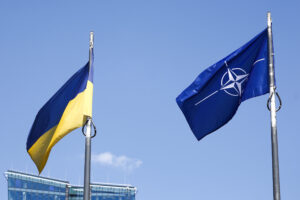
upport among Ukrainians for joining the North Atlantic Alliance as the best guarantee of security for Ukraine is declining, while support for more pragmatic options is growing, according to the results of a survey conducted by the Ilko Kucheriv Democratic Initiatives Foundation in conjunction with the Razumkov Center’s sociological service.
“…Despite the fact that a relative majority of the population still considers NATO to be the best alternative, compared to December last year, the share of the population that named NATO membership as the best option for ensuring security has fallen from 55% to 38%. The decline in support for NATO has not been accompanied by an increase in sympathy for non-aligned status as such. Instead, there has been a shift in expectations toward alternative, less ambitious, or more flexible security models. In particular, over the past year, there has been a noticeable increase in the proportion of those who place their hopes on strategic defense cooperation agreements with individual NATO member countries (from 9% to 15%). Support for Ukraine’s neutral status has also increased, but on condition of international security guarantees (from 12% to 16%), as well as for the option of relying exclusively on its own defense capabilities, even without external guarantees (from 3% to 7%),” the survey results say.
At the same time, it is noted that these shifts indicate not so much a change in value orientations as growing doubts about the realism of Ukraine’s rapid accession to NATO in the context of a protracted war and ambiguous signals from international partners.
There also remain significant regional differences in the choice of security model, which play an important role in shaping the respondents’ positions.
“Respondents from western regions are significantly more likely (53%) than residents of other regions to name NATO membership as the best guarantee of security. In the central regions, this option also dominates, although less clearly (39%). In the southern and especially eastern regions, the share of NATO supporters is significantly lower: 32.5% and 22%, respectively. In the southern regions, respondents are more likely to choose neutral status with international guarantees (23%). At the same time, in the eastern regions, there are the most respondents who could not decide on the best option for ensuring Ukraine’s security compared to other macro-regions – their share is 26%. This reflects both different experiences of war and different expectations regarding international support,” sociologists write.
However, a much more significant factor than the macro-region of residence is belief in Ukraine’s victory.
“Among respondents who believe in victory, NATO membership remains the most desirable option (49.5%). At the same time, among those who do not believe in victory, only a relative minority (14%) support this option. Meanwhile, in this group, support for neutral status with international security guarantees (from 12% to 27%) and the option of relying on one’s own forces without international guarantees (5% to 13%) is growing significantly. The strength of the link between belief in victory and the vision of a security model is clear, which allows us to speak of the systemic nature of this factor,” according to the survey results.
The nationwide survey was conducted by the Ilko Kucheriv Democratic Initiatives Foundation in cooperation with the Razumkov Center’s sociological service between December 5 and 16, 2025.
A total of 2,000 respondents aged 18 and older were interviewed face-to-face in Vinnytsia, Volyn, Dnipropetrovsk, Donetsk, Zhytomyr, Zakarpattia, Zaporizhia, Ivano-Frankivsk, Kyiv, Kirovohrad, Lviv, Mykolaiv, Odesa, Poltava, Rivne, Sumy, Ternopil, Kharkiv, Kherson, Khmelnytskyi, Cherkasy, Chernihiv, and Chernivtsi regions, and the city of Kyiv. In Zaporizhzhia, Donetsk, Mykolaiv, Kharkiv, and Kherson regions, the survey was conducted only in those territories controlled by the Ukrainian government and where there is no fighting.
The survey was conducted using a stratified multistage sample with random selection in the early stages of sample formation and a quota method of selecting respondents in the final stage, when respondents were selected according to gender and age quotas. The structure of the sample population reflects the demographic structure of the adult population in the territories where the survey was conducted as of early 2022, by age, gender, and type of settlement. The theoretical sampling error does not exceed 2.3%.
At the same time, additional systematic deviations in the sample may be due to the consequences of Russian aggression, in particular, the forced evacuation of millions of citizens.
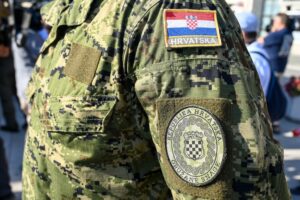
According to the Serbian Economist, Croatia is officially reintroducing compulsory military service on January 1, 2026 after a 17-year hiatus.
According to changes to the Defense Law approved by the Croatian Parliament in October 2025, the country is introducing two months of basic military training for conscripts amid rising tensions in Europe and the Balkans.
According to Ministry of Defense clarifications and government communications, the mandatory service will apply to men, primarily young men born in 2007 and onward, while women will be able to participate on a voluntary basis. The first calls for medical examinations are scheduled to be sent out at the end of December, while the first conscripts will enter military units in March 2026.
Basic service (temeljno vojno osposobljavanje) will last two months and include handling personal weapons, use of modern equipment, first aid and basic self-defense skills.
Recruits will receive about 1,100 euros per month (2,200 euros for the entire term of service), with payment for food, accommodation and travel; the time of service will be counted in the employment record. For conscientious objectors, civilian service in the civil protection system for up to three or four months with a lower payment (about 250 euros per month) is envisaged.
Previously, compulsory conscription in Croatia was abolished in 2008 amid the transition to a professional army and NATO membership. The authorities explain the decision to return military service by the need to strengthen defense capabilities and prepare the population to act in crisis situations against the backdrop of Russia’s war against Ukraine and the general growth of instability in the region.
https://t.me/relocationrs/2005

Strengthening cloud infrastructure and cybersecurity is one of the key areas for strengthening Ukraine’s “digital shield” in the context of the ongoing war, according to participants in the panel discussion “Rebuilding Smarter: Cloud Infrastructure and Cyber Security for a Strong Ukraine’s Digital Shield” at the “Rebuilding Ukraine: Security, Opportunities, Investments” forum in Bucharest.
The panel was moderated by Daniel Ionita, senior associate expert at the New Strategy Center (Romania). The discussion was joined by Oleg Haiduk, advisor on AI and innovation at the PARKOVY data center and former Deputy Minister of Defense of Ukraine for Digital Development; Volodymyr Luchenko, technical director at Kyivstar; Dragos Dima, senior cybersecurity advisor at the EU Mission for Civilian Security Sector Reform in Ukraine (EUAM Ukraine) and Olga Belyakova, co-head of technology, media, and communications practice at CMS Cameron McKenna LLC in Central and Eastern Europe.
According to the speakers, immediately after the start of the full-scale Russian invasion in February 2022, Ukraine transferred critical data arrays to data centers in the EU. By 2023, the strategy had been transformed towards the creation of sovereign national data centers with support for cross-border backup solutions. This transition was made possible by accelerated legislative changes, which by the end of the year provided a functional regulatory framework for the provision of cloud services.
In the field of cybersecurity, the key measures, according to the panel participants, are the widespread use of VPN solutions, the introduction of centralized access management (PAM), the use of multi-factor authentication, and the integration of WAF-class solutions to protect web resources. “This is not just about technical means, but about building a comprehensive architecture of trust – from the user to state registries and critical infrastructure,” said Haiduk.
The experts emphasized that Ukraine’s cyber resilience must be built in a cross-border format—through the integration of critical digital infrastructure into NATO and EU security systems, joint incident response protocols, and the exchange of threat data. “The more closely Ukraine’s digital infrastructure is integrated into the Euro-Atlantic security ecosystem, the more difficult it will be to isolate or paralyze it as a result of cyberattacks,” Belyakova emphasized.
Following the discussion, participants concluded that the development of national data centers, the expansion of cloud services, and the synchronization of cyber defense standards with NATO and the EU are necessary conditions not only for the security of the public sector, but also for the stable functioning of business and the implementation of reconstruction projects.
The forum “Rebuilding Ukraine: Security, Opportunities, Investments” is being held on December 11-12 in Bucharest under the auspices of the Romanian Ministry of Foreign Affairs and the Ukrainian Ministry of Foreign Affairs and is organized by the New Strategy Center. According to the organizers, more than 30 panel discussions and parallel sessions are planned over two days with the participation of representatives of governments, international organizations, the private sector, financial institutions, and experts from Europe, North America, and Asia. The topics of the panels cover security and defense, infrastructure, financing and investment, green energy, digitalization, human capital, and cross-border cooperation.
Bucharest, cloud infrastructure, digital shield, EU, INTEGRATION, NATO
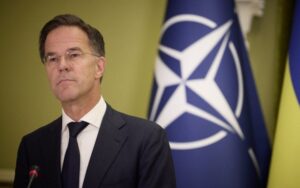
NATO Secretary General Mark Rutte announced Tuesday that the North Atlantic Alliance summit in 2026 will be held July 7-8 in the Turkish capital Ankara.
“I want to thank Turkey for organizing this important meeting. Turkey has been a loyal NATO ally for more than 70 years, making an invaluable contribution to our common security,” Rutte was quoted as saying by the organization’s headquarters.
“At our next summit, leaders will continue to work to make NATO a stronger, fairer and more effective alliance, ready to meet the critical challenges to our security,” the alliance secretary general said.
Turkey is hosting the NATO summit for the second time after Istanbul in 2004, Brussels recalled.
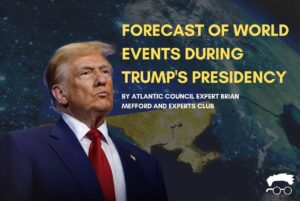
Today, Donald Trump will officially begin his term as the 47th President of the United States of America. His possible actions and strategies in the international arena were the main topic of discussion at a meeting of experts organized by the Atlantic Council and Experts Club. Brian Mefford, Senior Fellow at the Atlantic Council’s Eurasia Center, and Maksym Urakin, founder of the Experts Club, discussed key issues that will affect the geopolitical situation in the world, including Ukraine.
Brian Mefford noted that Trump’s first months in office will be focused on resolving domestic issues, such as the confirmation of his cabinet members in the Senate. However, the expert emphasized that Ukraine will remain an important issue in US foreign policy.
“Ukraine already has a special envoy, General Kellogg. Although his visit to Kyiv was postponed, it shows that Ukraine remains a priority. Its security is crucial for stability in the region,” Mr. Mefford said.
One of the key topics of discussion was Ukraine’s membership in NATO, which was first promised at the Bucharest Summit in 2008. According to Brian Mefford, this decision could have prevented many of the current problems.
“It was a serious mistake at the time. Russia used this uncertainty: first in Georgia and then in Ukraine. Now, because of the war on its own territory, the NATO issue for Ukraine is being postponed indefinitely. At the same time, there is a need for long-term security guarantees. Ukraine needs modern weapons, so the United States and European partners must remain reliable allies of Ukraine,” he explained.
At the same time, according to the expert, the issue of NATO funding became one of the most discussed during Trump’s first presidency, when he called on European countries to increase their defense spending.
“The United States spends more on defense than the next nine countries combined. Trump was right to insist that European countries spend at least 2% of GDP on defense. And now these requirements are being met. Increasing defense spending in Europe is in everyone’s interest. The alliance remains a powerful tool for ensuring stability,” Mr. Mefford emphasized.
According to him, the US withdrawal from NATO is currently an unlikely scenario.
Mefford suggested that the Trump administration will continue its tough economic policy towards China, including trade wars.
“China does not follow fair rules in international trade. Support for Taiwan will remain unchanged, as the United States has strategic interests in the region. Although China often demonstrates strength, its economy is on the verge of recession and its military power is exaggerated,” he explained.
The expert also touched upon the issue of sanctions against Russia, which remain an effective tool of international pressure.
“Trump imposed more sanctions against Russia during his previous term than Obama did. Their mitigation is possible only if the war ends. This is a long-term mechanism that cannot be ignored,” emphasized Mefford.
Maksym Urakin, founder of the Experts Club think tank, in turn, emphasized the importance of Donald Trump’s election for Ukraine and the world and reminded of other important elections for Ukraine and the region in 2025:
“For Ukraine, partnership with the United States is crucial. However, we need to be prepared for different scenarios and strengthen our economic resilience and diversify our foreign policy, given the very important elections this year in Germany, Poland, Romania, Moldova, and Canada. The world is becoming very dynamic in the future,” said Maxim Urakin.
The experts’ analysis showed that Trump’s policy toward Ukraine will be shaped by both internal and external factors. At the same time, Ukraine’s role in global security will only grow, and international support will remain critical for security on the European continent.
The full version of the video is available here:
You can subscribe to the Experts Club YouTube channel here:
https://www.youtube.com/@ExpertsClub
Atlantic Council, EXPERTS CLUB, NATO, SECURITY, TRUMP, UKRAINE, URAKIN, USA, Меффорд
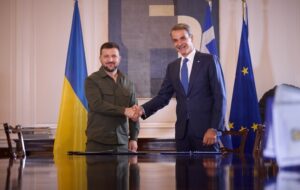
The Hellenic Republic supports Ukraine’s acquisition of NATO membership when the Alliance members agree and the conditions are met, as stated in the declaration of the NATO Vilnius Summit, the Joint Declaration of Ukraine and Greece on Ukraine’s Euro-Atlantic Integration has said.
According to the text of the document, Ukraine and the Hellenic Republic welcome Ukraine’s significant achievements in advancing on the path of Euro-Atlantic integration, in particular in achieving compatibility with NATO, as demonstrated by the Ukrainian Armed Forces on the battlefield, and reaffirm their commitment to strengthening joint efforts in support of Ukraine’s integration into the Alliance and the implementation of NATO standards.
It is noted that Greece will continue to support the Alliance’s strong and effective political and material support to Ukraine, aimed at ensuring Ukraine’s ability to effectively defend its territory on land, at sea and in the air.
The Hellenic Republic will continue to provide military, technical, defence and humanitarian support to Ukraine and commits to participate with international organizations, allies and partners in the reconstruction and rebuilding of Ukraine after the war.
Greece supports Ukraine’s acquisition of NATO membership when Alliance members agree and conditions are met, as stated in the NATO Vilnius Summit declaration.
In addition, the parties declare that Ukraine’s security is vital to the stability of the Euro-Atlantic region and fully support the Ukraine-NATO Council as a platform to further strengthen and expand ongoing cooperation to help realize Ukraine’s path to the Euro-Atlantic family.
In turn, it is noted that Ukraine highly appreciates all the important practical assistance provided by the Hellenic Republic and the people of the Hellenic Republic to strengthen Ukraine’s defense capabilities.
The full text of the Joint Declaration is available on the website of the Office of the President of Ukraine.